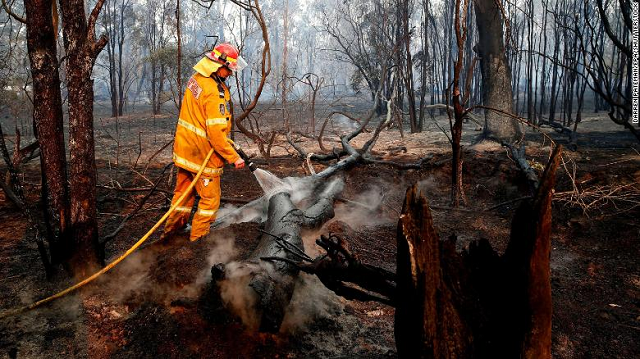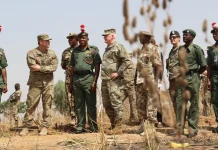Thousands of people are in the path of deadly Australian bushfires that have produced clouds of smoke seen as far away as New Zealand.
A seven-day state of emergency has been declared in New South Wales, where strong winds, high temperatures and low humidity have prompted the Rural Fire Service to issue a “catastrophic” fire warning for the greater Sydney region.
It’s the worst threat level ever issued for Sydney under the current system, which was introduced in 2009. The city is home to around 4.6 million people, but the greatest fire risk lies in rural areas outside the city center. They include the greater Hunter area, Illawarra, and Shoalhaven, which are also facing “catastrophic” fire threats.
“Homes that are specifically designed and built to withstand bushfires are not done so for catastrophic conditions. Catastrophic conditions are where lives are lost, it’s where people die. The risks are absolutely real,” New South Wales Rural Fire Commissioner Shane Fitzsimmons told CNN affiliate 9 News.
As of Monday afternoon, more than 70 fires were burning across New South Wales, the fire service said.
A state-wide fire ban will remain in place on Tuesday, preventing people from lighting open fires and engaging in activities that could start a fire, like welding and grinding. Offenders risk on-the-spot fines of 2,200 Australian dollars ($1,500).
Hundreds of schools in fire risk regions will be closed on Tuesday, according to local media. As of late Monday, around 50 fires were raging across the northern state of Queensland.
Australia is experiencing one of its worst droughts in decades. The hot, dry weather has created a huge amount of fuel for the fires, which are being fanned by strong winds.
“In catastrophic circumstances, routinely, you can expect the most extraordinary of fire behavior. It is not without question that spotting activity can be well and truly over 20 kilometers (12 miles) ahead of the main fire front,” Fitzsimmons said. Spotting refers to new fires lit by burning embers.
A “catastrophic” threat calls on people to evacuate ahead of time: “For your survival, leaving early is the only option,” the warning states.
The damage so far has been significant. Three people have been killed in the blazes and more than 100 homes have been lost. An estimated 350 koalas died in the fires and at least a dozen are being treated for injuries.
Satellite images showed smoke billowing more than 4,000 kilometers (2,500 miles) across the Tasman Sea to New Zealand’s South Island.
Climate crisis comes front and center
In recent years, bushfires have been occurring more frequently in Australia, starting earlier in the season and spreading with even greater intensity. Experts say the cause is the climate crisis.
The blazes that are currently engulfing the country’s east have focused attention on warnings issued by former senior fire officials earlier this year. They have been calling on the government to do more to combat the effects of climate change.
Greg Mullins, the former Commissioner of New South Wales’ Fire and Rescue Department, has been among the most vocal critics.
He and 22 other former high-ranking emergency service officials sent letters to Prime Minister Scott Morrison in April and September warning of the impact of the climate crisis on Australia and the possibility of “unprecedented fire danger,” Australian media reported.
“If anyone tells you, ‘This is part of a normal cycle’ or ‘We’ve had fires like this before’, smile politely and walk away, because they don’t know what they’re talking about,” Mullins wrote in a piece for The Sydney Morning Herald Monday.
Mullins said he wrote the piece reluctantly, noting that “some federal politicians dodge the question of the influence of climate change on extreme weather and fires by saying, ‘It’s terrible that this matter is being raised while the fires are still burning.'”
“But if not now, then when?” Mullins asked.
The Morrison government has been accused of not doing enough to address the climate crisis.
Morrison sidestepped questions this weekend when asked about climate change. On Saturday, he said “my only thoughts today are with those who have lost their lives and their families.
The firefighters who are fighting the fires, the response effort that has to be delivered and how the Commonwealth has green responded in supporting those efforts.”
On Monday, Deputy Prime Minister Michael McCormack lashed out at Australian Greens party members who had linked the fires to climate change.
“I don’t need the ravings of some pure, enlightened and woke capital city greenies,” McCormack told ABC Radio National. “What people need now is a little bit of sympathy, understanding and real assistance. They need help, they need shelter.”
Carol Sparks, the mayor of Glen Innes, who was herself evacuated from the path of a fire over the weekend, slammed federal politicians for failing to directly link the fires to the climate crisis.
“It’s climate change, there’s no doubt about it. The whole of the country is going to be affected. We need to take a serious look at our future,” the mayor, who is a member of the Greens party, told the Australian Associated Press.
“Of course it’s not relevant at the moment when people’s houses are burning and you’ve lost lives and you’ve lost friends and you’ve lost family,” Sparks said. Two residents of Glen Innes were killed in the fires.
“But the overall thing is we are so dry in this country — we haven’t had rain for years in some places. We need to look at what we’re going to do about that in the future,” she said.
Morrison says his critics gloss over Australia’s record on combating the climate crisis and claims his government has been effectively balancing the needs of Australia’s economy and “taking real action on climate change.”
“Australia’s internal and global critics on climate change willingly overlook or perhaps ignore our achievements, as the facts simply don’t fit the narrative they wish to project about our contribution,” he said at the United Nations General Assembly last month.
Source: CNN













